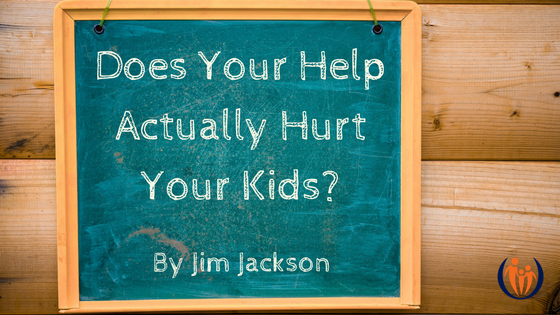
Does Your Help Actually Hurt Your Kids?
“Oh, honey, come here. Let’s fix that.” Or, “Hey kiddo, let’s clean up that mess.”
Nearly every parent has repeated phrases like these, perhaps many times. With small kids, there’s probably no harm in using this phrase or approach to things from time to time. You see a smear of mustard on your child’s face and say, “Come here sweetie, let’s clean up your face.” The mustard is gone, your child goes her merry way, and you don’t have to worry about mustard stains on the couch. Or their room is a mess, and you say, “C’mon honey, let’s clean your room.” Then you do most of the cleaning because it’s more efficient.
What happens over time though, if this is a regular dynamic, is that kids hear the phrase, “Let’s do this,” and they learn to interpret it to mean, “Someone will do this for me.” As kids grow up accustomed to mom and dad doing things for them, they come to expect it. And not just from mom and dad, but from everyone.
I recently saw this dynamic play out at a local coffee shop in an upscale mall. I went in to grab a cup and there was quite a long line. In it, in front of me, was a woman with three youngsters ranging from pre-teen to early teen. The three left what I presumed was their mom and headed out to the mall. I decided, rather than wait in line, to go use the restroom before ordering. When I arrived at the restroom the three teens had beat me there and were jostling and joking as they did their business. I slipped past them unnoticed into a private stall. From inside I heard the boys continue their joking and start the water to wash up. They tore into the paper towel dispenser and started what seemed to be a little paper towel wad fight. I could see that paper towels were starting to collect on the floor. One of them joked about the mess they’d made, and another announced, “It’s no biggie, they pay people to clean this up.” Then they left.
I wondered to myself what the world is coming to. I mean, I was as selfish and thoughtless a kid as I knew when I was a teen. But I never would have thought to do such a thing. I had the decency and sense of respect to understand that it was not okay to intentionally leave a big mess in a public restroom. My mind wandered to the unique challenges of raising affluent kids.
When I returned to the coffee shop the line had subsided and the teens were back in the line behind their mom, about to take her turn to order. The barista looked at the group and asked for their orders. The mom looked at the oldest boy and he shrugged. “You just want the usual?” she asked him. I snickered a bit which drew his attention to me. My stomach was churning about what I’d seen in the restroom, and whether I’d say anything. This might be a chance to gently at least say something. So I smiled at the teen and kindly said, “You look old enough to order for yourself.” Before he could respond his mom snapped back at me, “You bet he can order for himself! This is no spoiled kid.” He looked away, and she turned to the barista and ordered four mocha lattes.
My stomach is still churning.
The sad part about this to me is that while the mom is right, he can order for himself, her doing it for him builds in him an expectation that even though he can do it himself, someone else will do it. Just like someone else is paid to clean up his messes. This is a child who is poised to go through life believing that keeping him happy and cared for is someone else’s job. He’ll likely meet and marry a woman he expects to take care of him. He’ll expect his workplaces and supervisors to cater to him. Until he learns to take responsibility for his own life, he’ll become mostly a taker from the world instead of a giver to it.
It all starts with, “Come here honey, let me help you.”
If you want kids who grow up to be givers, stop doing stuff for them that they can do for themselves. Empower them to do it themselves and teach them how their actions impact others.
Be careful how you help. It may not really be helping at all.
Struggling with “I don’t wanna do it!” attitudes in your home? Enroll today in our online course “The Entitlement Fix: Growing Hard Work and Gratitude in Your Kids”


